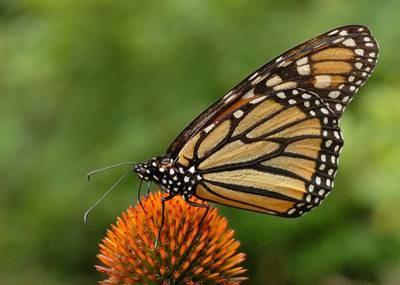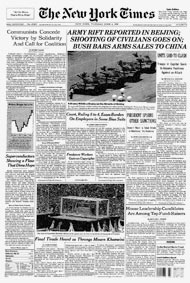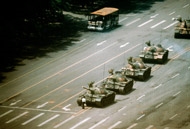 |
| The Butterfly Effect (http://upload.wikimedia.org/wikipedia/commons/b/b5/Monarch_Butterfly_Danaus_plexippus_on_Echinacea_purpurea_2800px.jpg) |
The Monarch butterfly beats its wings anywhere between 5 and 12 times per second. Each wing beat, creating a disturbance in air currents, can offer the minuscule difference that shapes a “partly cloudy” forecast into a “tornado watch.” This is called the butterfly effect, the idea that small, seemingly insignificant events — like the fluttering of a butterfly’s wings — can produce tremendous and unanticipated consequences. A hero’s moment is the moment in which a butterfly’s wing beat can decide the fate of the world. The hero being one whose courage unites and inspires his people, whose gallantry brings him to the front lines of conflict, and whose defiance against what is wrong shines through darkness. On the morning of June 5th, 1989, the Unknown Rebel’s heroic stand before a column of tanks in Tiananmen Square was only a wing beat in the face of time; a wing beat that forever shook the world.
 |
| The New York Times: July 6th, 1989 (http://graphics8.nytimes.com/packages/flash/photo/20090602-Lens-Behind-Tianamen/20090603-tank-newspaper-190px.jpg) |
Jan Wong, foreign correspondent for the Globe and Mail, sets the story in Tiananmen Square. “It's not a welcoming place. It's not like Central Park, where you'd want to gather, because there is not a tree there; there's no shade. There [are] just big, tall lampposts with cameras on the top that swivel around…” In the oppressed silence of the square, armed military tanks paraded awkwardly through the “Avenue of Eternal Peace.” The Communist Party was again in control of the plaza that symbolized the heart of its power, and the broad road was devoid of humanity before the fearsome display of force. Suddenly a slight figure in a white shirt and black trousers, a shopping bag in each hand, dashed out into the road and stood waiting as the tanks approached. The lead vehicle halted. It was a breathtaking standoff. China’s authority had been challenged, and at this, the world was gasping.
He rose and fell into the dark waters of anonymity, and in his tense minutes of international fame, all that was seen of him was his back, but it was the ordinary nature of his action that was so extraordinary; it was the fact that for once, the camera lens didn’t need to be filled from frame to frame with demonstrators and signs, and that the message came across louder and clearer than ever before. “I think his action captured peoples’ hearts everywhere, and when the moment came, his character defined the moment, rather than the moment defining him. He made the image,” Charlie Cole, photographer for Newsweek magazine, recounted. That’s really all it was: defiance, simplicity. Because he believed he was the last resort for his country, he stood firm, a hero to all who beheld the spectacle. What really struck as heroic, was the idea that this man, like Superman or Batman, put away his cape (figuratively) and never came forward with his identity. “If he were to come forward, he would end one of the great unsolved mysteries of the 20th century.” Jane Macartney, The Times (UK) columnist wrote. “But doing so might diminish the power of his courageous act: an Everyman who chose to show indomitable spirit in the face of the tyranny of dictatorship.” The anonymity was a beautiful thing in that he wasn’t a matador, yearning for attention through colorful clothing and dances as the bull rushed in his direction, he was a simple, ordinary man whose instinct for survival clashed with the looming death wish that seemed to overtake him. There was no time, no credence to his parading around for fame and glory, there was only time to make a statement and leave. This spirit emanated a selfless nature only associated with heroes.
 |
| The Standoff (Stuart Franklin, TIME Magazine) |
It’s difficult to avoid the comfort of protesting in crowds. It’s safer. That’s why animals travel in herds; protection comes in numbers. But in this deserted road, he stood alone, and the tanks came within a second or two of killing him. (Barren) The odds were, he was going to get killed. And in its own quiet way, this confrontation spoke volumes of the fragility of the government’s standing, because they knew that they were crossing moral boundaries. It could have been that he was outraged at the destruction the government caused, and by taking a stand on the front lines, he wanted to give his life as a symbol, to garner a red badge of courage. (Barren) After all, the millions before him who had given their lives for liberty had all been christened heroes. They did not die in vain, and neither would he. Heroes’ valor and bravery never did cease to bring them to action, and that’s why they are heroes.
Morality and conviction, valor and gallantry, all come together and tie into courage. A leader, visionary, or rebel without their courage, has nothing. Their courage is our inspiration. Because of his stand against oppression, the Unknown Rebel caused a ripple of events including President George H.W. Bush’s suspension of U.S. arms sales to China to protest the military’s massacres, and furthermore, he called on people around the world to stand symbolically with the young Chinese demonstrator who braved a column of tanks. Bush, like many, was awed and inspired to stand with this tank man, who for seven or so minutes, captivated the world. Later, Bush recounted he was haunted by the bravery of that individual that stood alone in front of the tanks rolling down the main avenue. “What is it that gives him the courage to stand up in front of a column of tanks right there in front of the world?" Bush asked. "All I can say to him, wherever he might be, and to the people around the world is we are and we must stand with him." World leaders who stood on the focal points of history with the decisions that shape our world had been awed with this man’s courage. All that was left for them was to spread the word and bring attention to this mysterious man and his valiance. Courage isn’t something one stumbles into very often, and it’s hard to make out from impulsiveness, but more often than not, it is acts of courage that demand the inspired action of others, and not impulsiveness.
I’m sure there were many butterflies out on that fateful day, shaping weather as we know it, beating their wings to determine our fates. The air was putrid with the smell of fresh massacre, and the tanks were rolling on the charred streets, and through the befuddled silence, one man stood up for what he believed in, taking himself to the direct line of fire with courage that shocked even our most prominent world leaders. His moment was beautiful in that it wasn’t his. It was the moment of all that had been massacred at the hands of an unjust government. It was one last measure to keep the peace, one extra wingbeat that shocked the world. Heroes are defined by these moments. “A hero is no braver than an ordinary man, but he is braver five minutes longer,” Ralph Waldo Emerson wrote. His five minutes are a symbol, and for them, he is and forever will be a hero.
Page created on 5/21/2010 12:00:00 AM
Last edited 5/21/2010 12:00:00 AM
